
Chargeurs de VE
Système de gestion thermique de la batterie
Climatisation électrique
Climatisation entraînée par moteur
Fabricant de chargeur de bus électrique en Chine. Fournit des solutions personnalisées pour la charge de bus électrique.
✲ Charge d'une heure: E-BUS ajoute environ 240-480 km
✲ Pouvoir de charge élevé: 120KW à 240KW
✲ Robuste et fiable: CE, Arai et autres certificats
✲ Système de gestion intelligent: Pratique pour la gestion des opérations
✲ Compatibilité élevée: CCS2, CHAdeMO, et GBT
TKT electric bus charging stations have been developed, designed, and manufactured since 2014. We have extensive OEM experience. Our smart, fast charging systems are designed to meet the needs of public transport fleets, including providing OEM customization. Actuellement, we are working with some of the world’s top 500 customers such as BYD and TATA motors.
Electric buses, as a mode of public transportation, are usually required to operate around the clock. High passenger capacity, frequent starting and stopping, and energy consumption of auxiliary equipment such as air conditioners result in much higher power consumption than ordinary electric vehicles. Donc, they are usually equipped with a larger battery capacity, which reduces the number of recharging times. They are also usually equipped with faster charging speeds to ensure continuous operation.
For all these reasons, we have designed this electric bus charging solution: 120~240kW. It has two charging ports and can charge two electric buses at the same time, which can increase the utilization rate. Deuxièmement, it has a very fast charging speed, which can significantly reduce the charging dwell time of electric buses.
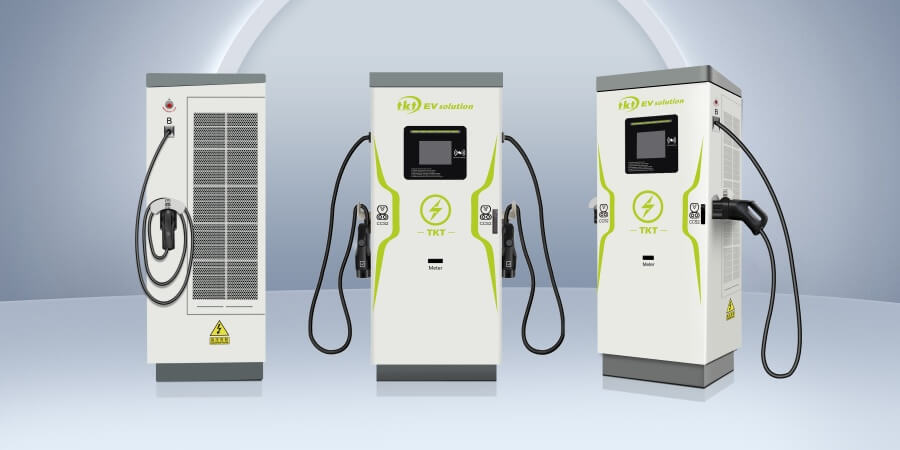
120-240 KW DC Station de charge rapide (Click for details)
Electric buses generally consume between 56 et 60 kWh of electricity per 100 kilometers. If a 120kW charger is used to charge an electric bus, theoretically, 120 kWh of electricity can be charged per hour. The range of the electric bus is then approximately 240 kilometers. It should be noted that the actual charging efficiency and range may be affected by a number of factors, such as the efficiency of the charger, ambient temperature, vehicle load, etc.. The above calculations are for reference only.
If a 120kw electric bus charging station charges two electric buses at the same time, the charging power of each vehicle will become 60kw.
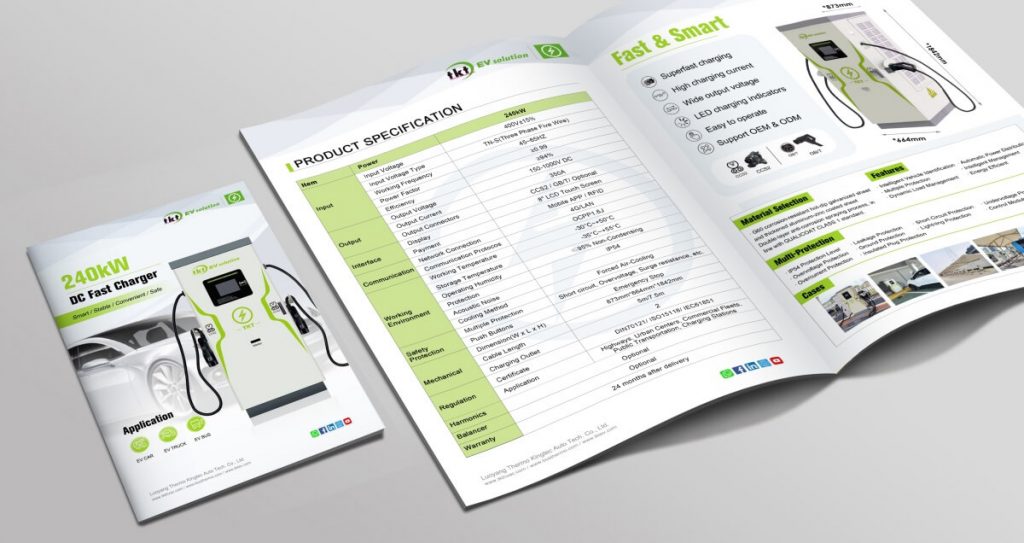
1.1 Advanced power semiconductor materials: TKT chargers use advanced power semiconductor materials such as silicon carbide (SiC) to improve conversion efficiency and reduce energy loss.
1.2 Conception modulaire: 30kW/40kW high power charging module is adopted as the base. The modular design allows the charger to flexibly expand the charging power according to your needs.
2.1 Multi-standard interface design: support CCS2, GBT, and other charging interfaces, compatible with BYD, Yutong, TATA motors and other brands of buses.
2.2 Automatic recognition of protocol adaptation: Built-in multiple communication protocol stacks automatically recognize the charging protocols of connected electric bus charging. This improves compatibility with a wide range of electric buses and ensures a safe and fast-charging experience.
2.3 More flexible than pantograph charger: not picking the model of electric buses, it is more flexible to be used as and when it comes.
3.1 Multiple protection mechanisms, including overload protection, protection contre les courts-circuits, protection contre les fuites, over-temperature protection, etc., ensure the safe operation of the equipment in various working conditions.
3.2 High-quality components: selected components of famous international brands to ensure product stability and durability.
3.3 Failure self-diagnostic function: real-time monitoring of the state of the equipment, automatic detection and recording of fault information, to facilitate maintenance personnel to quickly locate the problem.
4.1 Human-computer interaction interface: Equipped with high-definition touch screen, supporting multi-language switching, intuitive operation, and improving user experience.
4.2 Cloud platform management: Provide a cloud-based management platform, support remote monitoring, data analysis, diagnostic de défaut, and other functions to improve operational efficiency.
TKT has a dedicated service team to provide online support for our hardware and software systems. You don’t need to panic if any problems arise.
As the original electric vehicle charger manufacturers, TKT also provides training on proper maintenance and troubleshooting. This will help extend the life of the electric bus charging station.
 Electric Bus Charging Solution Project
Electric Bus Charging Solution ProjectLe projet est notre partenariat avec BYD-Olectra, Le premier fabricant de bus électrique de l'Inde. The number of fast electric vehicle chargers has already exceeded hundreds in the first batch.
En tant qu'ingénieur en chef électricien, M. Dinesh a mené la construction et l'entretien de l'infrastructure de charge. Il a dit, “Your electric vehicle chargers played a key role in our project. It has greatly increased the frequency of bus trips.”
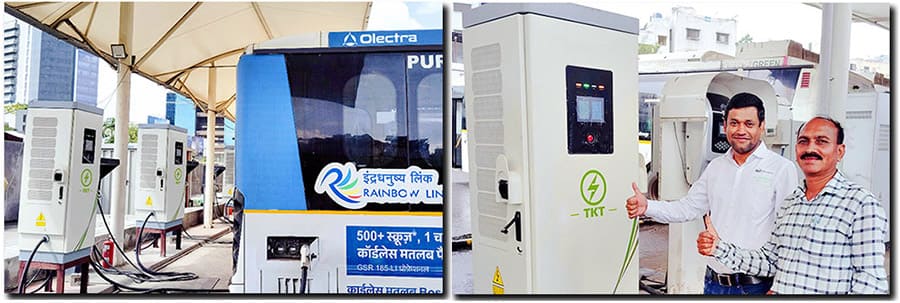
En général 2 années. Si vous avez des exigences particulières, veuillez contacter notre service client. Le délai de livraison est 30-45 jours de travail, cela dépend de la quantité et du calendrier de production.
Electric buses have a large battery capacity, so they need a DC fast charging station to meet it. There are generally two types. One is the DC high-power electric bus charging station recommended on this page, and the other is a pantograph charger.
The one on this page has wider versatility and cost-effectiveness and can charge two electric buses at the same time.
The pantograph charger must be OEM customized by the electric bus. The advantage is fully automatic charging without human intervention. The disadvantage is that it is very expensive, as well as being unavailable for other electric buses.
There are many factors affecting this, depending on your electric bus battery capacity, the maximum charging power accepted by the BMS, the power of the electric bus air-conditioner, and road conditions.
The cost of constructing an electric bus charging station varies depending on a number of factors. This includes the size of the charging station, equipment selection, site rental, transformateurs, construction costs, and government subsidies. Judging from our past experience, it should be at least $100,000 or more.
electric bus charging infrastructure, borne de recharge pour bus électriques, electric bus charging systems, recharger les bus électriques, electric bus charging station cost

En avril 7, Solution TKT EV, un fabricant de nouveaux chargeurs de véhicules énergétiques et climatiseurs, a établi sa nouvelle entreprise Hainan.
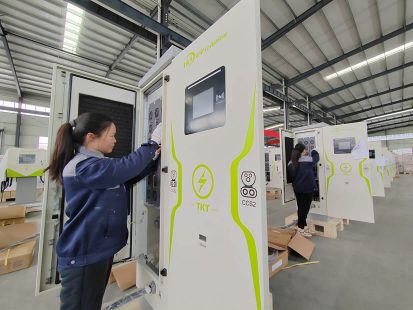
TKT est l'un des principaux fabricants de chargeurs China EV avec des usines en Chine et en Inde. Nous prenons une technologie innovante comme notre compétitivité de base.
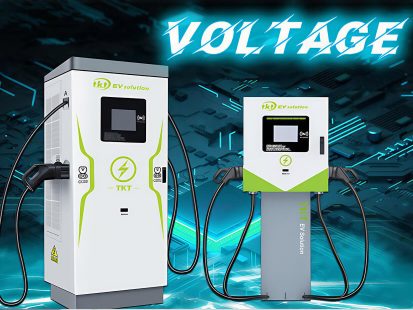
Le chargeur EV est un dispositif de précision. Si la tension de charge EV CC n'est pas sélectionnée correctement, Il y aura de nombreux problèmes graves.